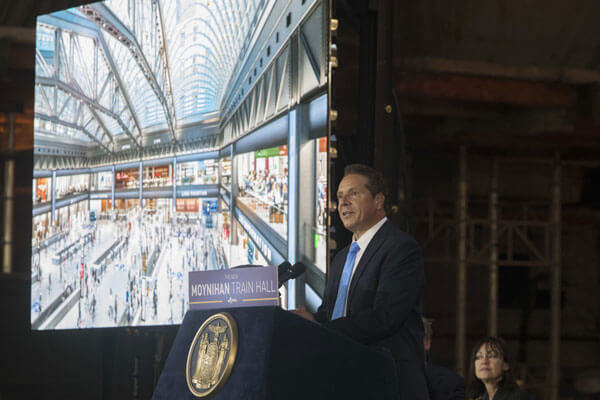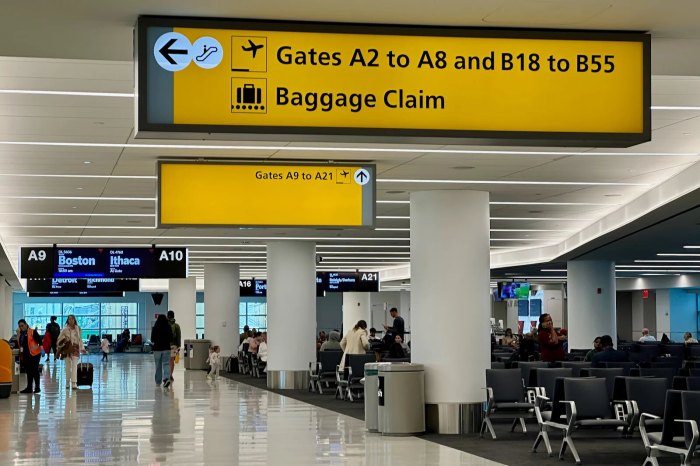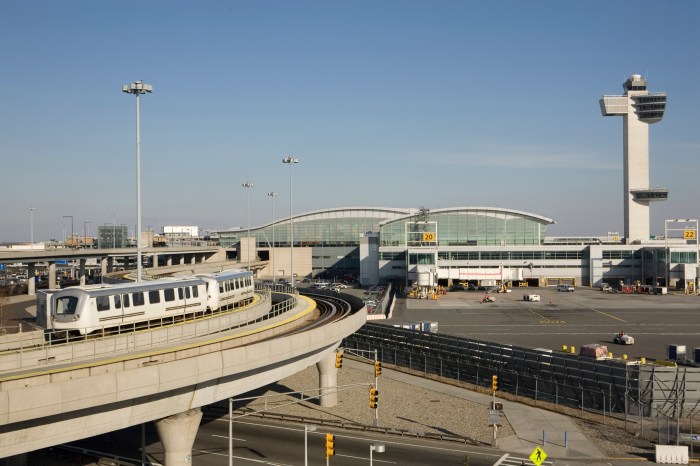By Mark Hallum
Gov. Andrew Cuomo announced last week that construction had begun on the Moynihan Train Hall, the city’s majestic former post office, which will become the new destination for Long Island Rail Road and Amtrak passengers as an annex to Penn Station.
The original train station, considered one of the architectural masterpieces in the city, was torn down in 1963 and replaced by an uninspiring transit hub for LIRR riders, Amtrak passengers and straphangers. Low ceilings, fast food restaurants and second-class design only underscored the folly of demolishing the classical European-style station, which faced another impressive structure across Eighth Avenue called the James A. Farley Building.
Workers were photographed last week installing floor work at the Farley site, until recently the city’s 24-hour post office, which was renamed in honor of the late U.S. Sen. Daniel Patrick Moynihan (D-NY). The $1.6 billion renovation project will create 255,000 square feet of train hall while offering 700,000 square feet of new commercial space.
Workers had also begun demolition on the floor slab of the former post office’s sorting room to kick off construction.
Cuomo said the train hall was part of his initiative to keep the city’s infrastructure as up to date as possible with transit overhauls and new bridges being built, such as the new completed Kosciuszco Bridge. The governor included the emergency repairs to the subways in his infrastructure initiative after calling declaring a state of emergency for New York City transit in June in order to expedite upgrades because of endemic meltdowns and a derailment.
“Investing in the subway system, $8 billion, and pledging $400 million to fund the emergency repair program. Why?” Cuomo said. “Because the subway system is the economic circulatory system of the entire city. You slow the subway system, you slow that economic circulatory system. And you do it at your own peril. And these are not plans, my friends, these are not dreams. They’re not subject to approvals, they’re not subject to hope — $100 billion, 250,000 jobs created — these projects are underway, shovels in the ground, every one of them being built by the men and women of organized labor in the state of New York.”
Renovations to the Farley Building will create 12,000 construction jobs, while it is projected to provide 2,500 permanent jobs upon completion.
Cuomo and MTA Chairman Joseph Lhota have been grappling with what the governor has dubbed the “summer of hell” for riders traveling through Penn Station, which has reduced its capacity by 19 percent for eight weeks as Amtrak completes a series of repairs affecting service for LIRR, NJ Transit and Amtrak customers after a series of accidents and derailments.
But the LIRR reported a relatively minor dip in ridership in the first two weeks of the “summer of hell,” according to transit officials at an MTA board meeting in July. LIRR President Patrick Nowakowski presented figures which showed a decline of about 11,000 riders through Penn Station, compared to the baseline of 86,000, during the morning peak hour on Week Two. Evening peak hour through the transit hub only saw a drop of about 4,000 commuters.
Apart from the subways and the Moynihan Train Hall, a broad array of capital improvement projects is currently underway to overhaul the Long Island Rail Road to accommodate the modern needs of its ridership. Cuomo announced in late July a total of $5.6 billion in state funds would be spent adding additional tracks, renovating about 40 stations and adding vital infrastructure to increase train capacity by 80 percent.
Cuomo referred to the nearly seven decades of little improvement to the LIRR’s infrastructure as a period of “stagnation” in a July release, which detailed full upgrades to Jamaica and Flushing stations in Queens, as well as new systemwide signaling for the entire network and an overhaul of tracks.
Reach reporter Mark Hallum by e-mail at mhall




































